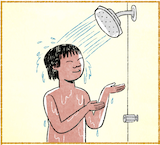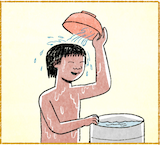

พุซายคนนี้เขากำลังเฮ็ดหญัง พุซายคนนี้เขากำลังอาบน้ำ กำลังอาบน้ำพุเดียวของเขานั้นหละ กำลังอาบน้ำอยู่ในห้องน้ำ
เขาใซ้อี่หยังอาบน้ำ เขากะอาบน้ำ เขากะเปิดฝักบัวหลือว่าเปิดสายยาง เป็นฝักบัว แล้วกะอาบ เปิดน้ำ แล้วมันกะสิไหลออกมาในฝักบัวนั้น แล้วเขากะอาบเนาะ แล้วเขากะถูๆ โต ถูไปมา ให้โตเจ้าของสะอาดเนาะ
5
พุซายคนนี้เขากำลังเฮ็ดหญัง เขากะกำลังอาบน้ำ เขากำลังอาบน้ำอยู่
แล้วเขาอาบน้ำอยู่ใส เขากะอาดสิอาบน้ำอยู่ในห้องน้ำ หลือว่าเขาอาดสิอาบน้ำอยู่หม้องโอ่ง หลือว่าอยู่นอกห้องน้ำ หลือว่าอยู่ในห้องน้ำกะได้ เพาะว่าเขามีถังน้ำ แล้วเขากะใซ้ขันตักน้ำอยู่ในถังนั้น แล้วกะเอาน้ำมาอาบโต มาล้างโต ถูๆ โต ให้โตมันสะอาดเนาะ
บางคนกะบ่ได้อาบอยู่ในห้องน้ำกะได้ เพาะว่าบางบ้านอาดสิมีโอ่งอยู่ข้างนอกบ้าน อยู่หน้าบ้าน หลังบ้าน หลือว่าข้างบ้านกะได้ มีโอ่งเนาะ แล้วกะตักน้ำอยู่หม้องโอ่งนั้น อาบๆๆ ล้างโต บ่ได้อาบ บ่ได้ใซ้ฝักบัว บ่ได้ใซ้สายยางอี่หยังมากมายเนาะ กะใซ้แค่น้ำในโอ่งส่ำนั้นเนาะ
Link to overview page
Link to dictionary
| Isaan | Pronunciation | Tones | Thai | English/Notes |
|---|---|---|---|---|
| พุซาย | phu-sa:i | H-HR | ผู้ชาย | man, male |
| คน | khon | HR | คน | person, people |
| นี้ | ni: | HF | นี้ | 1. this 2. here |
| เขา | khao | M | เขา | personal pronoun: he, she |
| กำลัง | gam-laŋ | M-HR | กำลัง | auxiliary indicating continuous or progressive action |
| เฮ็ด | het | H | ทำ | to do, to make |
| หญัง | ɲaŋ | M | อะไร, เป็นหญัง = ทำไม | 1. what {เขากำลังเฮ็ดหญัง = What is he doing?} {ธูปเอาไว้เฮ็ดหญัง = What are incense sticks for?} 2. something, anything, (nothing) 3. เป็นหญัง[...]คือ in initial position: why {เป็นหญังเขาคือใส่บักพิกลงไปในกวยเตียว = Why is he putting chili in [his] noodle soup?} {เป็นหญังหน้าต่างมันคือเปิด = Why is the window open?} {เป็นหญังมันคือมีควนไฟ = Why is there smoke?} |
| อาบน้ำ | a:p-na:m | LF-HF | อาบน้ำ | to take a bath/shower |
| พุเดียว | phu-di:ao | H-M | คนเดียว | 1. alone, by oneself {เขากำลังยืนอยู่พุเดียว = she's standing by herself} {เขานั่งอยู่พุเดียว = he's sitting by himself} 2. one person |
| ของ | khɔ:ŋ | M | ของ | of, belonging to |
| นั้นหละ | nan-la | HF-M | นั่นแหละ | auxiliary for emphasis at the end of a phrase |
| อยู่ | yu: | H | อยู่ | 1. to be (located) at 2. yet, still 3. auxiliary indicating continuous or progressive action {ทอดปาอยู่ในกะทะ = (in the process of) frying a fish in the pan} {แม่กำลังเมี้ยนเฮียนอยู่ = mother is cleaning/tidying up the house} |
| ใน | nai | HR | ใน | in, within |
| ห้องน้ำ | hɔŋ-na:m | LF-HF | ห้องน้ำ | bathroom |
| ใซ้ | sai | HF | ใช้ | to use |
| อี่หยัง | i:-yaŋ | H-M | อะไร | 1. what {นี้คืออี่หยัง = What is this?} {มื้อนี้เจ้าเฮ็ดอี่หยัง = What are you doing today?} {กินเข้างายกับอี่หยัง = What did you have for breakfast?} 2. something, anything, (in negations) nothing {บ่ต้องเฮ็ดอี่หยังอีกเลยนอกจากใส่ปุย = [we] don't need to do anything besides adding fertilizer} |
| กะ | ga | M | ก็ | 1. then, consequently 2. also |
| เปิด | pə:t | M | เปิด | 1. to open {เปิดหน้าต่าง = to open the window} {เปิดปะตู = to open the door} 2. to start, to switch on {เปิดไฟ = to switch on the light} {เปิดแอ = to switch on the A/C} |
| ฝักบัว | fak-bu:a | M-M | ฝักบัว | shower {ฝักบัวอาบน้ำ = shower} |
| หลือ | lʉ: | M | หรือ | or |
| ว่า | wa: | H | ว่า | 1. that, as {คำว่า X = the word X} 2. to say |
| สาย | sa:i | M | สาย | 1. string, thread, wire, cord {หูฟังมีสาย = the headphones have a cord} {สายไฟ = power cord} 2. clf. for rivers, bus lines, phone calls {แม่น้ำสายนี้ข้ามบ่ได้ = you can't cross this river} {มีสายเข้า = there's an incoming call} |
| ยาง | ya:ŋ | M | ยาง | 1. rubber, resin, plastic {ถุงยาง = plastic bag} 2. tyre {ลดยางแบ็น = the car has a flat tyre} |
| เป็น | pen | M | เป็น | 1. to be, to exist 2. to be able to 3. to suffer, sth. happens to 4. เป็นหญัง[...]คือ in initial position: why? {เป็นหญังเขากะคือแปงฟัน = Why is he brushing his teeth?} {เป็นหญังเคี่ยงบินมันคือสิตก = Why is the airplane falling down?} |
| แล้ว | lɛ:o | HF | แล้ว | 1. finished 2. already 3. and then, and next (especially แล้วกะ) 4. auxiliary for past tense |
| อาบ | a:p | LF | อาบ | to bathe, to wash |
| น้ำ | na:m | HF | น้ำ | 1. water 2. drink, soft drink, juice |
| มัน | man | HR | มัน | it (also used to refer to people) |
| สิ | si | M | จะ | future tense auxiliary {เขากำลังสิตื่น = he's about to wake up} {สิไปตะหลาด = [I'm] going to the market} |
| ไหล | lai | M | ไหล | to flow |
| ออก | ɔ:k | LF | ออก | 1. to go out, to leave 2. out |
| มา | ma: | HR | มา | 1. to come 2. auxiliary expressing action towards the present or focal time {กะคุเฮ็ดมาจากอี่หยัง = What is the bucket made of?} {แล้วเขากะเก็บเงินจากพุนั้นมา = and then she takes the money of that person} |
| นั้น | nan | HF | นั้น | that, there |
| เนาะ | nɔ | H | เนาะ | final particle: makes the statement softer, looking for agreement |
| ถู | thu: | M | ถู | to scrub, to rub, to wipe, to clean |
| โต | to: | M | ตัว | 1. body, self 2. clf. for animals, characters/letters/consonants, appliances, clothes (e.g., pairs of trousers, shirts) |
| ไป | pai | M | ไป | 1. to go 2. auxiliary indicating action extending into the future |
| ให้ | hai | LF | ให้ | 1. to give {หมอกำลังเอายาให้คนป่วยกิน = the doctor is giving the patient medicine} 2. for 3. to allow, to be allowed |
| เจ้าของ | jao-khɔ:ŋ | HF-M | เจ้าของ | 1. personal pronoun: oneself 2. owner |
| สะอาด | sa-a:t | M-LF | สะอาด | clean |
| ใส | sai | M | (ที่)ไหน | 1. where? {สิไปใส = Where are [you] going?} {มาแต่ใส = Where are [you] coming from?} {กะทะอยู่ใส = Where's the pan?} 2. somewhere, anywhere {ใสกะได้ = anywhere, wherever you like} |
| อาด | a:t | LF | อาจ | 1. might, may, will 2. likely |
| หม้อง | mɔŋ | LF | ที่, แห่ง, บริเวณ | 1. place, area {หลายที่หลายหม้อง = in many places} {หม้องใดหม้องหนึ่ง = some place} 2. clf. for places |
| โอ่ง | o:ŋ | H | โอ่ง | big earthen jar (usually for water) |
| นอก | nɔ:k | HF | นอก | outside |
| ได้ | dai | HF | ได้ | 1. can 2. to get, to obtain 3. before verb: indicating past tense 4. บ่ได้ + verb: not |
| เพาะว่า | phɔ-wa: | H-H | เพราะว่า | because |
| มี | mi: | HR | มี | 1. to have 2. there is |
| ถัง | thaŋ | M | ถัง | 1. bucket 2. gas/petrol tank {ถังน้ำมัน = gas/petrol tank} |
| ขัน | khan | M | ขัน | bowl |
| ตัก | tak | M | ตัก | 1. to scoop {ตักน้ำ = to scoop water} 2. to shovel/dig {เอาพั้วตักดิน = to dig with a spade} |
| เอา | ao | M | เอา | to take, to give {เขากำลังเอาก่องไปซั่ง = he's taking the boxes to weigh them} {หมอกำลังเอายาให้คนป่วยกิน = the doctor is giving medicine to the patient} {เอาไว้ถ้า = is for, is used for, has the purpose of} |
| ล้าง | la:ŋ | HF | ล้าง | to wash |
| บาง | ba:ŋ | M | บาง | 1. some {สัดบางโตบ่มีขา = some animals don't have legs} {บางคนสิมักกินกวยเตียวแทนเข้า = some people like to eat noodle soup instead of rice (dishes)} {บางสิ่งบางอย่าง = something, anything} 2. thin |
| บ่ | bɔ: | H | ไม่ | 1. no, not 2. question particle, transforming a statement into a question Notes: spelling exception in line with common usage on social media |
| บ้าน | ba:n | HF | บ้าน | 1. house, home 2. village (also used as a prefix before the name of a village) 3. home country, home region {บ้านเฮาเฮ็ดเข้าจั่งใด = How do we plant rice in Isaan/Thailand?} |
| ข้างนอก | kha:ŋ-nɔ:k | LF-HF | ข้างนอก | outside |
| หน้า | na: | LF | หน้า | 1. front {ปะตูหน้า = front door} 2. face {เขากำลังล้างหน้า = he's washing his face} 3. auxiliary: conditional tense {เขาหน้าสิเป็นพุบ่าวพุสาวกัน = they are probably groom and bride} {กะหน้าสิส้มอยู่ = it's likely to be sour} 4. season {หน้าฮ้อน = hot season} 5. page 6. clf. for pages {เฮาอ่านฮอดหน้านั้นแล้ว = we've read until this page} |
| หลัง | laŋ | M | หลัง | 1. back, after 2. back (of body) {ขี่หลังควย = to ride on a water buffalo} 3. clf. for houses {บ้านหลังใหญ่ = a large house} {เฮียนไม้หลังเก่า = an old wooden house} |
| ข้าง | kha:ŋ | LF | ข้าง | 1. side {มีหูจับสองข้าง = there are handles on both sides} 2. next to {วางอยู่ข้างๆ ก่องใบใหญ่ = it's placed next to the large box} {เขายืนอยู่ข้างๆ อีกพุหนึ่ง = he's standing next to another person} 3. clf. for body parts which come in pairs (eyes, ears, legs etc.) {เขามีตาสองข้าง = she has two eyes} |
| มากมาย | ma:k-ma:i | HF-HR | มากมาย | 1. many, numerous, various 2. plentiful, abundant, a lot of |
| แค่ | khɛ: | H | แค่ | only |
| ส่ำนั้น | sam-nan | H-HF | แค่นั้น | 1. just that, only that 2. that much |